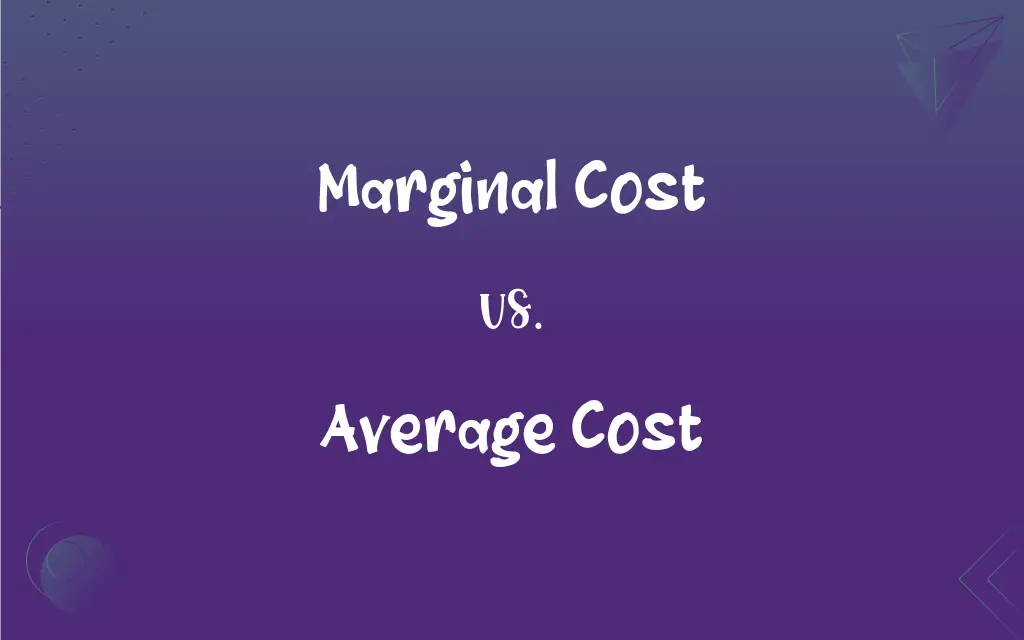Marginal Cost vs. Average Cost: What's the Difference?
Edited by Aimie Carlson || By Harlon Moss || Published on February 11, 2024
Marginal cost is the cost of producing one additional unit of a product. Average cost is the total cost of production divided by the number of units produced.

Key Differences
Marginal cost focuses on the cost incurred in producing one additional unit, reflecting the changes in total cost with the production of each extra unit. Average cost, on the other hand, is concerned with the total cost of production divided by the total number of units produced, offering an overall cost per unit.
Businesses use marginal cost to determine the impact of increasing production and to set prices that cover the cost of producing one more unit. Average cost helps in understanding the general efficiency of the production process and in setting prices that can cover overall costs and yield profit.
Marginal cost can vary significantly with changes in production volume, especially if increasing production requires additional resources or triggers higher costs. Average cost tends to decrease as production increases, benefiting from economies of scale, until it reaches a minimum point.
In economics, marginal cost is crucial for understanding the supply curve and for making decisions about resource allocation. Average cost is important for analyzing the overall cost efficiency of a firm and for comparing with industry benchmarks.
Marginal cost is directly linked to the decision of whether producing an additional unit is profitable. Average cost, when compared to the selling price, gives a broader view of the overall profitability of the business.
ADVERTISEMENT
Comparison Chart
Focus
Cost of one additional unit
Total cost per unit
Decision-Making Use
Assessing cost of increasing production
Setting prices, evaluating efficiency
Fluctuation with Production
Varies with each additional unit
Decreases with volume, then stabilizes
Economic Significance
Critical for understanding supply decisions
Important for overall cost efficiency
Profitability Implications
Determines if additional production is profitable
Indicates overall business profitability
ADVERTISEMENT
Marginal Cost and Average Cost Definitions
Marginal Cost
Variable cost of one additional unit.
The marginal cost included additional materials and labor.
Average Cost
General measure of production efficiency.
A lower average cost indicated improved operational efficiency.
Marginal Cost
Cost of producing one more unit of a product.
The marginal cost of producing one more widget was $10.
Average Cost
Total cost of production divided by quantity produced.
The average cost per unit was lower due to increased production.
Marginal Cost
Extra cost incurred for additional output.
They calculated the marginal cost to decide on expanding production.
Average Cost
Indicator of cost competitiveness.
The company's average cost was competitive in the industry.
Marginal Cost
Incremental cost change due to increased production.
As production ramped up, the marginal cost per unit decreased.
Average Cost
Benchmark for pricing and profitability.
They set prices above the average cost to ensure a profit margin.
Marginal Cost
Cost analysis for incremental production decisions.
Marginal cost analysis helped in pricing the new product.
Average Cost
Per unit cost reflecting both fixed and variable costs.
Their average cost included rent, utilities, and labor.
FAQs
Does average cost always decrease with increased production?
Initially, yes, due to economies of scale, but it can stabilize or increase after a point.
What is marginal cost?
The cost of producing one additional unit of a product.
Can marginal cost affect pricing?
Yes, it's used to set prices that cover the cost of additional production.
How does average cost relate to profitability?
It indicates whether the price of a product covers the cost of production for overall profit.
What factors influence marginal cost?
Factors like labor, materials, and changes in production efficiency.
Is average cost fixed?
No, it can change with the scale of production and cost conditions.
Why is marginal cost important?
It helps businesses decide whether producing another unit is financially viable.
How is average cost calculated?
By dividing the total cost of production by the number of units produced.
What happens if marginal cost is higher than price?
Producing additional units would not be profitable.
Can average cost help in competitive pricing?
Yes, it aids in setting competitive prices while ensuring profitability.
When does marginal cost change?
With each additional unit produced, especially if new resources or processes are needed.
Does marginal cost include opportunity cost?
Yes, it can include opportunity costs associated with production choices.
What role does average cost play in budgeting?
It helps in forecasting costs and setting financial targets.
Is marginal cost more relevant for short-term decisions?
Yes, it's crucial for immediate production and pricing decisions.
Can a business survive with a high average cost?
It's challenging, as it might indicate inefficiencies or uncompetitive pricing.
Does average cost include fixed costs?
Yes, it includes both fixed and variable costs.
Can marginal cost be negative?
Rarely, usually in cases of cost-saving efficiencies at higher outputs.
Why might average cost increase?
Due to higher fixed costs or decreased production efficiency.
How does technology affect marginal cost?
Improved technology can lower marginal costs by increasing efficiency.
Is reducing average cost always beneficial?
Generally, yes, as it improves profitability and competitiveness.
About Author
Written by
Harlon MossHarlon is a seasoned quality moderator and accomplished content writer for Difference Wiki. An alumnus of the prestigious University of California, he earned his degree in Computer Science. Leveraging his academic background, Harlon brings a meticulous and informed perspective to his work, ensuring content accuracy and excellence.
Edited by
Aimie CarlsonAimie Carlson, holding a master's degree in English literature, is a fervent English language enthusiast. She lends her writing talents to Difference Wiki, a prominent website that specializes in comparisons, offering readers insightful analyses that both captivate and inform.






































































